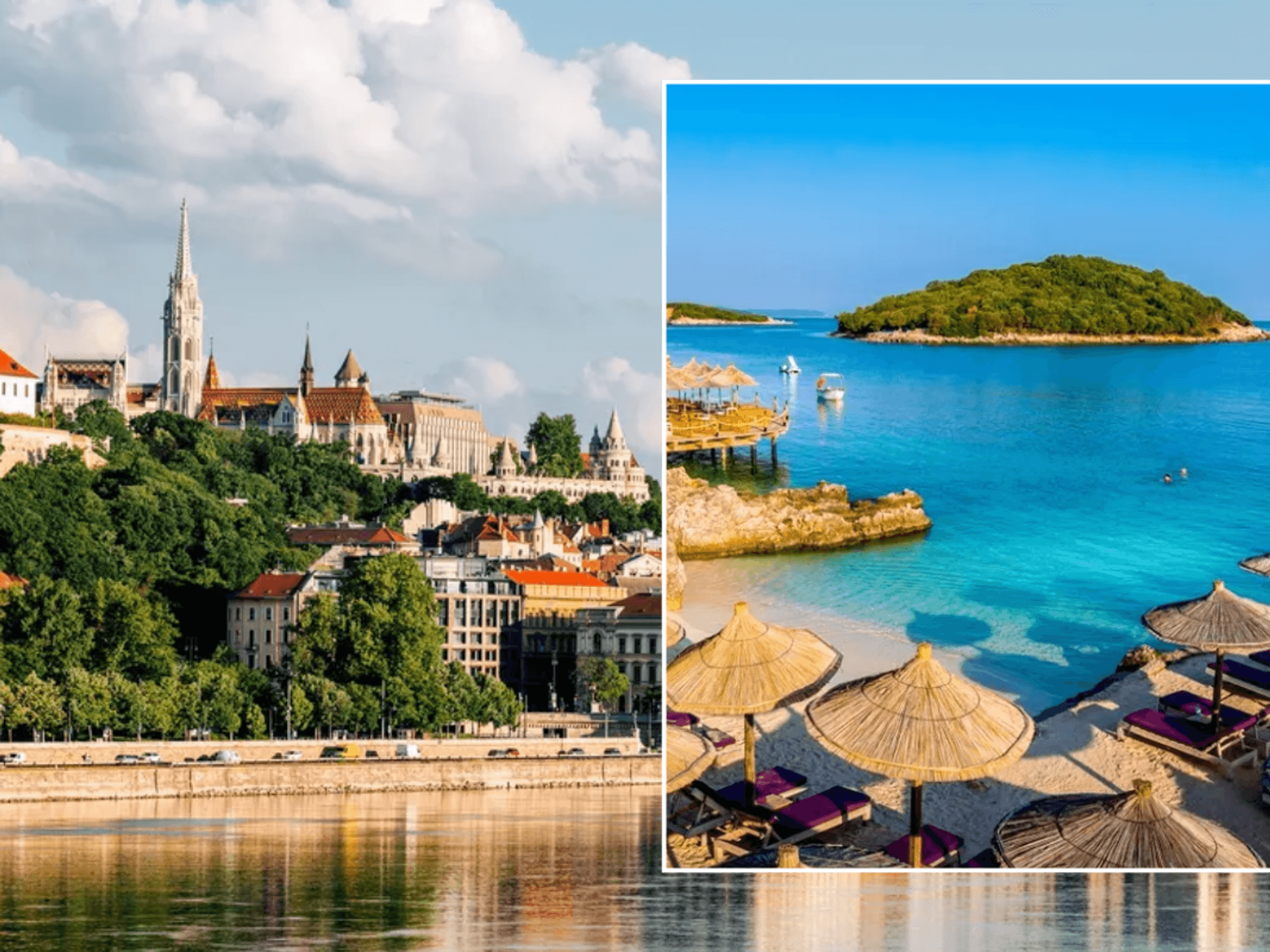Greece plane crash: Plane fighting wildfires bursts into flames after smashing into hillside
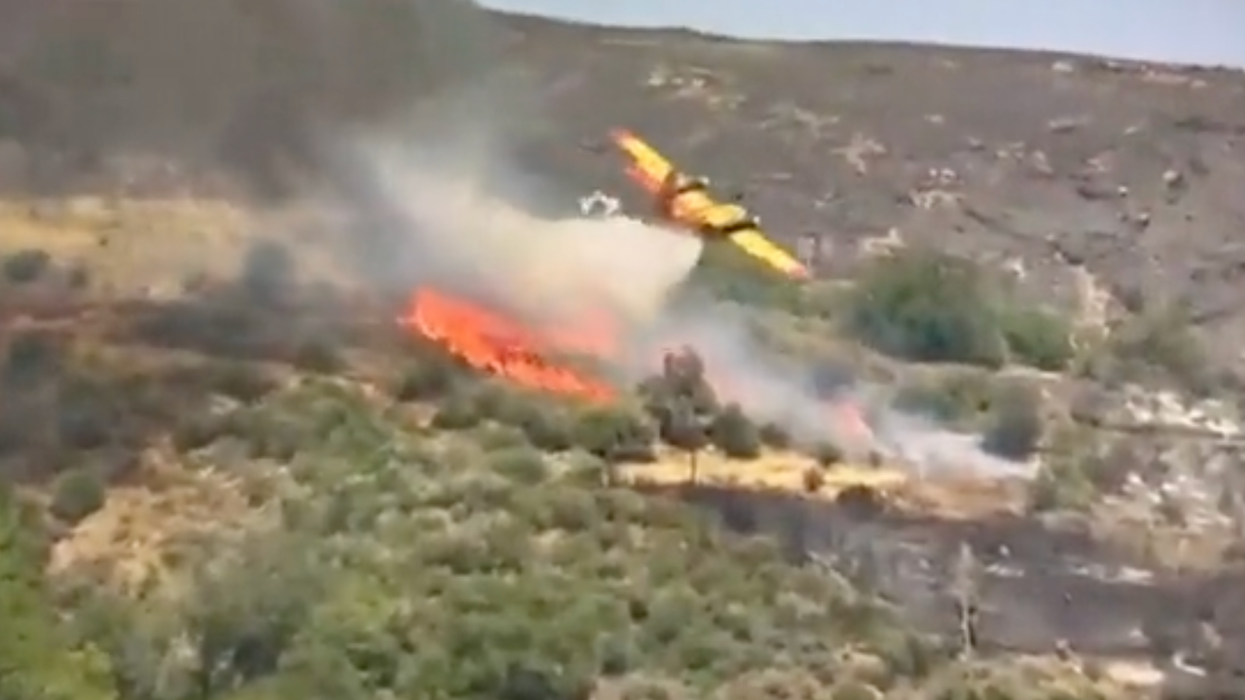
In a video circulating on social media the plane is seen swooping low over the fire before crashing into a fireball
|The crash occurred over the island of Evia near Athens
Don't Miss
Most Read
An amphibious Canadair CL-215 plane combatting the wildfires in Greece has crashed with 'at least two people on board', the Greek air force and fire service has confirmed.
State broadcaster ERT showed footage of the plane dropping water over a fire, then crashing into a hillside and bursting into flames near the town of Karystos on the island of Evia.
The disaster comes on the seventh day of wildfires in Greece, where infernos have spread at an alarming rate, scorching the earth and herding humans towards the beaches.
Fire service spokesman, Yannis Artopios, is quoted by AFP as saying: "A Greek Canadair plane with at least two people on board crashed near Platanisto."
The air force confirmed that two helicopters have rushed to the scene to carry out a search and rescue operation, though it gave no details on the fate of the airmen.
Rampant wildfires in Rhodes have left 5,000 Brits stranded, as the Foreign Office and holiday operators scramble to put on emergency repatriation flights.
A further 30,000 British holidaymakers with holidays booked find themselves in limbo, for hotels and resorts across the Greek islands have closed indefinitely.
Kyriakos Mitsotakis, the Greek prime minister, declared "war" on the fires on Monday and cautioned that this might only be the beginning.
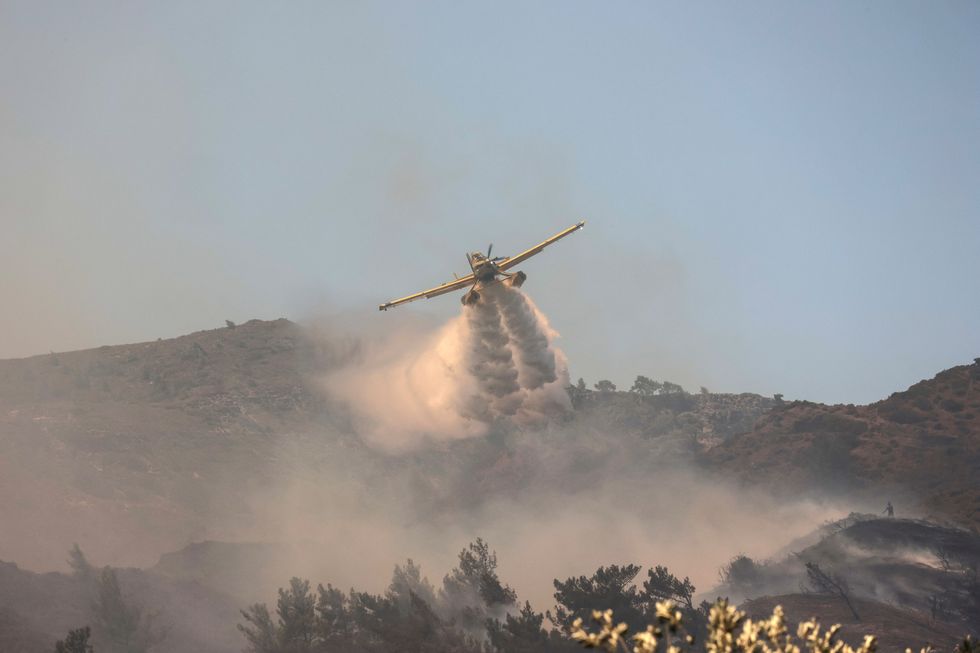
A firefighting plane makes a water drop as a wildfire burns near the village of Vati, on the island of Rhodes, Greece, July 25, 2023.
|Reuters/Nicolas Economou
Mitsotakis said: “Do not be fooled. It will be a difficult summer.”
He added: "All of us are standing guard. In the face of what the entire planet is facing, especially the Mediterranean which is a climate change hot-spot, there is no magical defence mechanism, if there was we would have implemented it."
The wildfires come as temperatures in Greece continue to soar over 40C, with forecasts warning that highs of 44C could take hold of the country on Wednesday.
Thousands have also been moved from hotels on Corfu and the island of Evia, while Crete has been placed on red alert.
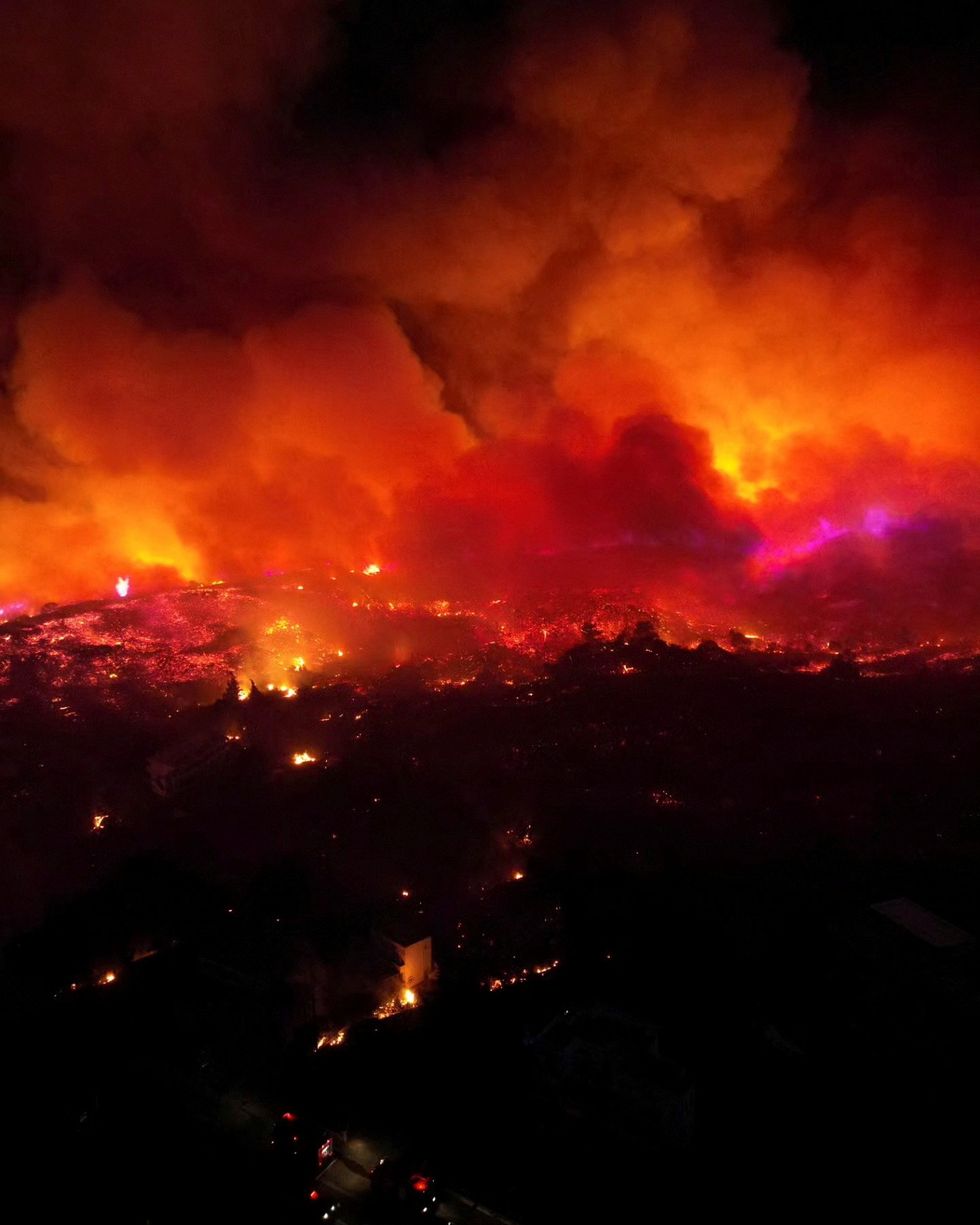 Smoke rises from a wildfire on the island of Rhodes, Greece, July 23, 2023, in this picture obtained from social media. | Ted G. Bailos via Reuters
Smoke rises from a wildfire on the island of Rhodes, Greece, July 23, 2023, in this picture obtained from social media. | Ted G. Bailos via Reuters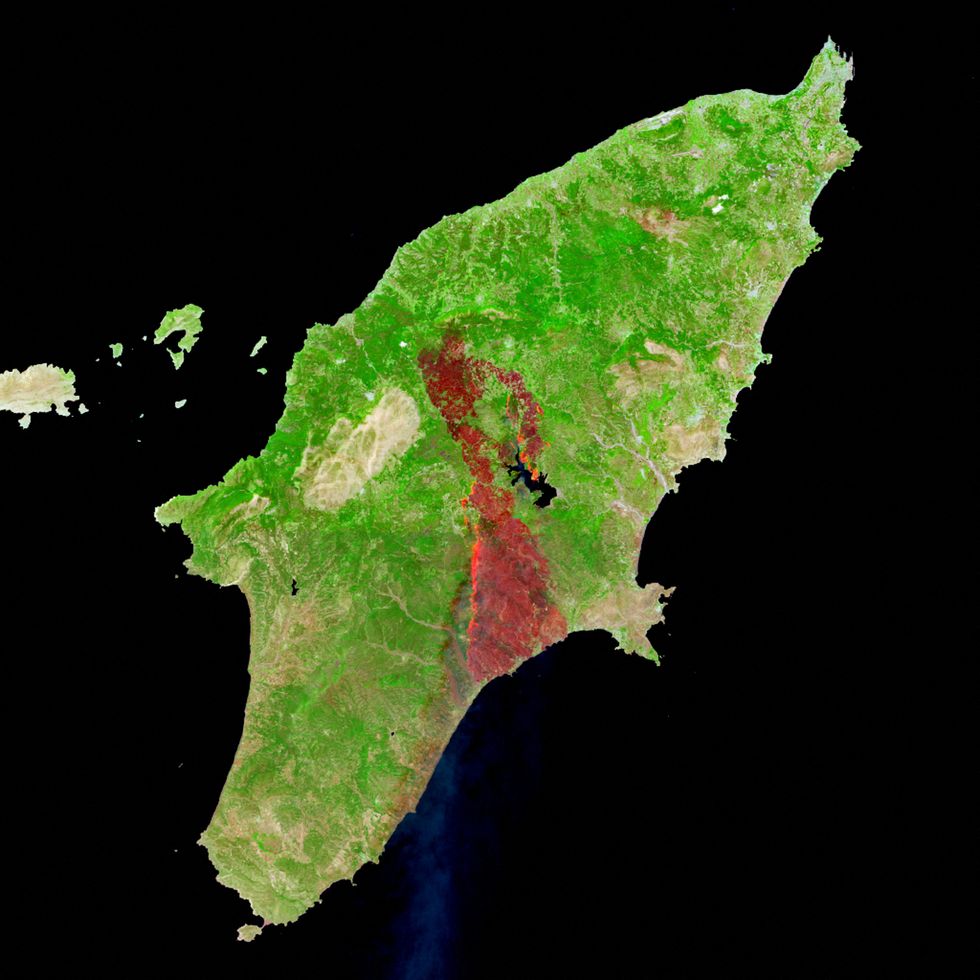
A false colour satellite image, which uses the infrared signature of the fire, shows the area affected by wildfires in Rhodes, Greece, July 23, 2023.
| European Union/Copernicus Sentinel-2/Handout via ReutersIn Greece, a prosecutor on Rhodes launched an investigation into the causes of the fires and the preparedness and response of authorities, state broadcaster ERT said. It said about 10% of the island's land area had burned.
Aside from Greece, parts of south-western Turkey, Crete, Sicily and Sardinia all have some form of extreme fire weather outlooks for the coming days.
An assessment by scientists published on Tuesday said human-induced climate change has played an "absolutely overwhelming" role in the extreme heatwaves that have swept across North America, southern Europe and China this month.
More to follow...
GREECE FIRES LATEST:
- 'War' declared on Rhodes wildfires as 30,000 Britons left in limbo
- Rhodes wildfires 'caused by arson' say Greek firefighters after XR blames climate change
- EasyJet and RyanAir keep flying tourists to holiday hell in Rhodes as wildfires force biggest evacuation in Greek history
- Thousands of tourists urgently evacuated from hotels in British holiday hotspot as wildfires rage out of control
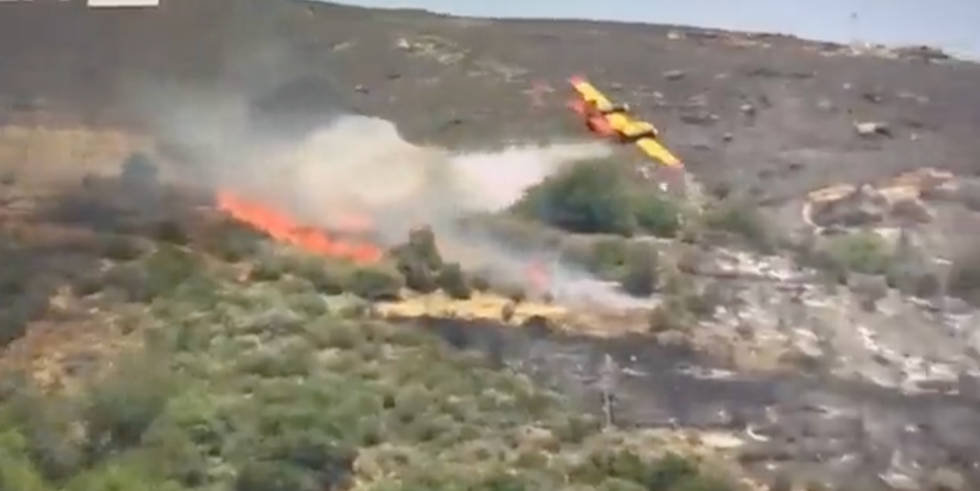
More than 270 firefighters have been enlisted to douse 82 wildfires across Greece
|The World Weather Attribution team estimated rising greenhouse gas concentrations has made the European heatwave 2.5C hotter than it otherwise would have been.
Izidine Pinto of the Royal Netherlands Meteorological Institute said: “European and North American temperature would have been virtually impossible without the effects of climate change.”
However, Rhodes fire brigade has suggested the fire on the island may have been started by an arson attack.
Friederike Otto, a scientist with the Grantham Institute for Climate Change in London, said: “The events we have looked at are not rare in today’s climate.”
She added: “As long as we keep burning fossil fields we will see more and more of these extremes.”







